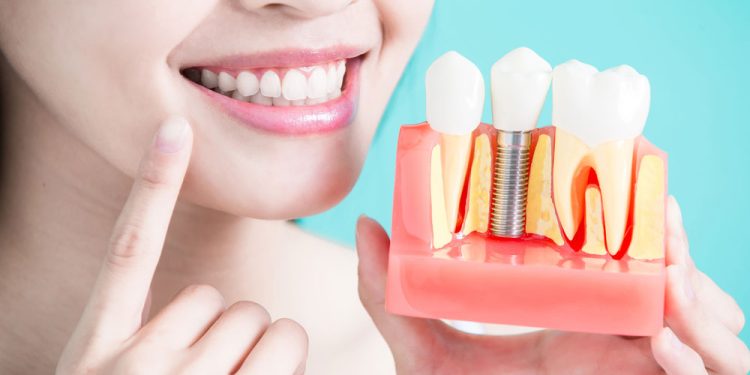Dental implants are fabulous teeth-replacement solutions that can last a lifetime. When properly planned, prepared and placed by a trained and experienced dental implant surgeon, your new replacement teeth should ultimately require nothing more than normal oral health maintenance at home and with your dentists as recommended. Whether you’re replacing a single tooth, a fixed dental bridge or a full mouth of failing and/or missing teeth, your new restorations should look, function and feel just like regular teeth. There are, however, various steps you can take to help further ensure a long-term, great result.
#1 Find the Right Dental Professional
Your overall experience towards a healthier, more confident and aesthetically attractive smile with dental implants begins by ensuring you are in the best hands. Your dentist will probably refer you to a periodontal specialist or oral surgeon for dental implants. If your general dentist tells you that he or she can place dental implants, don’t be afraid to ask what kind of experience the individual has had with this very specialized surgery. If there are issues later, will he or she send you to someone else for complication management? If so, shouldn’t you just start with the professional with the level of training and experience needed to avoid those problems in the first place?
#2 Not All Implants Are Created Equal
There is no “one-size-fits-all” dental implant product or procedure, and don’t let anyone tell you otherwise. The replacement tooth will start with a biocompatible titanium post surgically placed into your jaw, one that has been strategically selected to match the configuration needed for your jawbone. You should be aware that there are thousands of different types of dental implants with widely varied materials, scientific documentation and qualities. Not all dental implants are the same! A connecting piece called an abutment will secure the final dental restoration, a single porcelain crown or prosthesis.
The titanium implants are manufactured in various diameters, heights, textures and sizes. There are hundreds of these “parts” manufacturers out there competing for a slot in this popular and profitable market, but there are only a handful of the top companies with whom your dental specialists should be working with. Ask questions: A discounted surgical quote could be the result of generic components offered by a company that doesn’t offer the kind of quality control, research and reliable history of the top manufacturers your specialist should be utilizing. It is important to remember that you are replacing a body part (a tooth or set of teeth), which you would like to last for the rest of your life. How much discount are you willing to trade off for an uncertain result?
Similarly, the allure of seeking treatment outside the U.S. (sometimes known as vacation dentistry or dental tourism) may seem enticing but comes with a laundry list of caveats. What do you really know about the destination other than that the bargain prices advertised sound too good to be true? Can you verify the doctor’s background, technology and materials to be utilized, or even what sort of infection control is the norm at the practice? How are you going to manage complications remotely?
Our suggestion: Do your homework and then stay “home.” Find a local practice with great reviews and dental specialists who have published in peer-reviewed journals, ones who clearly stay on top of the latest research and industry standards and utilize strategically selected components from the world’s best manufacturers. If issues or questions occur, you’re not going to want to hop back on a plane. As our colleagues and I say, “It’s never cheaper to do it twice.”
#3 Smoking is NEVER a Good Idea
The success rate of dental implants is more than 98%. But decades of patient scenarios and mounting clinical evidence show us that smokers have a lower success rate of 2-8% of initial implant healing compared to non-smokers. Smokers also tend to lose bone around implants and have higher long-term complication rates compared to non-smokers.
Smoking doesn’t just inflame gums and stain replacement teeth. It can slow down the essential healing process known as osseointegration, the way that your jawbone tissue naturally fuses with the surgically implanted, biocompatible titanium post(s), which now will serve as sturdy replacement tooth roots to support the individual crown restoration or prosthesis. Nicotine decreases healthy blood flow that’s needed for bone health, can cause dry mouth, and reduce saliva (a natural antibacterial) production. If you’ve ever needed a reason to stop smoking – now’s the time to help ensure the success of your oral health investment.
#4 Avoid if Possible
- Sugar is the fuel that energizes bacteria that cause decay. Do not allow sugar to be in contact with teeth for long periods of time without brushing or using fluoride toothpaste.
- Abrasive toothpaste. Brushing twice daily is as important as ever – try soft-bristled or electric toothbrushes.
- Alcohol may interfere with the healing process and with post-surgical medications. Alcohol can increase your risk of infection and, in the case of drinks with acidic mixers or high sugar content, can contribute to decay. It’s dehydrating and can suppress cellular growth, which is important during the healing process. Reduce alcohol consumption or just avoid it if possible, at least while you’re healing.
#5 Address (Rare!) Issues
You’ll care for your dental implants just like natural teeth, with twice daily brushing, flossing and regular checkups. But if this care isn’t followed, inflammatory conditions can occur that might affect the stability and health of your dental implant restoration. Implant success can be affected because of untreated gum disease and by individuals who continue smoking and have certain autoimmune diseases.
If you experience any sort of discomfort after surgery, schedule a prompt appointment with your specialist. Digital x-rays and a thorough examination will show if there is any problematic jawbone tissue loss or recession. In an otherwise healthy mouth, and when caught early enough, your specialist can often remove the infection to help your gum and bone tissue heal around your implants.
Nothing in life is guaranteed, but dental implants are considered among the most predictable procedures performed in medicine. A seasoned dental implant surgeon will guarantee his or her work, assuming you follow all at-home and professional maintenance instructions. Find a practice that tells you they will re-treat issues at their cost if there’s an outcome that can’t be attributed to noncompliance or a change in your overall health. Follow instructions and enjoy having the ability to eat, speak and smile again with confidence!
Lilliana Aranguren, DDS, MDSc is a bilingual (Spanish) board-certified periodontist and dental implant surgeon who practices at the South Florida Center for Periodontics & Implant Dentistry in Boca Raton, Florida. A Fellow of the International Team for Implantology (ITI) and other local, state and national associations, she is originally from Venezuela.








































